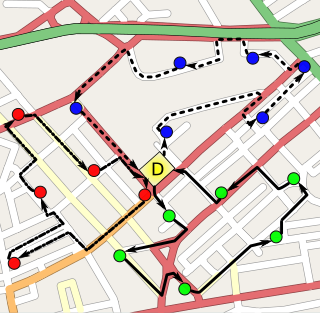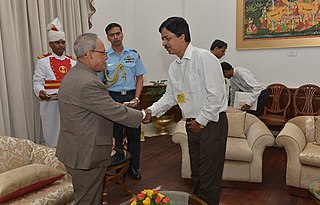Related Research Articles

Computer science is the study of computation, information, and automation. Computer science spans theoretical disciplines to applied disciplines. Though more often considered an academic discipline, computer science is closely related to computer programming.
An intrusion detection system is a device or software application that monitors a network or systems for malicious activity or policy violations. Any intrusion activity or violation is typically reported either to an administrator or collected centrally using a security information and event management (SIEM) system. A SIEM system combines outputs from multiple sources and uses alarm filtering techniques to distinguish malicious activity from false alarms.

Machine learning (ML) is a field of study in artificial intelligence concerned with the development and study of statistical algorithms that can effectively generalize and thus perform tasks without explicit instructions. Recently, generative artificial neural networks have been able to surpass many previous approaches in performance. Machine learning approaches have been applied to large language models, computer vision, speech recognition, email filtering, agriculture and medicine, where it is too costly to develop algorithms to perform the needed tasks.
Unsupervised learning is a paradigm in machine learning where, in contrast to supervised learning and semi-supervised learning, algorithms learn patterns exclusively from unlabeled data.

Theoretical computer science (TCS) is a subset of general computer science and mathematics that focuses on mathematical aspects of computer science such as the theory of computation, formal language theory, the lambda calculus and type theory.
Network security consists of the policies, processes and practices adopted to prevent, detect and monitor unauthorized access, misuse, modification, or denial of a computer network and network-accessible resources. Network security involves the authorization of access to data in a network, which is controlled by the network administrator. Users choose or are assigned an ID and password or other authenticating information that allows them access to information and programs within their authority. Network security covers a variety of computer networks, both public and private, that are used in everyday jobs: conducting transactions and communications among businesses, government agencies and individuals. Networks can be private, such as within a company, and others which might be open to public access. Network security is involved in organizations, enterprises, and other types of institutions. It does as its title explains: it secures the network, as well as protecting and overseeing operations being done. The most common and simple way of protecting a network resource is by assigning it a unique name and a corresponding password.

The University of Colorado Colorado Springs (UCCS) is a public research university in Colorado Springs, Colorado. It is one of four campuses that make up the University of Colorado system. As of Fall 2017, UCCS had over 12,400 undergraduate and 1,822 graduate students, with 32% ethnic minority students. It is classified among "R2: Doctoral Universities – High research activity".
Neville A. Stanton is a British Professor Emeritus of Human Factors and Ergonomics at the University of Southampton. Prof Stanton is a Chartered Engineer (C.Eng), Chartered Psychologist (C.Psychol) and Chartered Ergonomist (C.ErgHF). He has written and edited over sixty books and over four hundred peer-reviewed journal papers on applications of the subject. Stanton is a Fellow of the British Psychological Society, a Fellow of The Institute of Ergonomics and Human Factors and a member of the Institution of Engineering and Technology. He has been published in academic journals including Nature. He has also helped organisations design new human-machine interfaces, such as the Adaptive Cruise Control system for Jaguar Cars.
In artificial intelligence, artificial immune systems (AIS) are a class of computationally intelligent, rule-based machine learning systems inspired by the principles and processes of the vertebrate immune system. The algorithms are typically modeled after the immune system's characteristics of learning and memory for use in problem-solving.
Inventory control or stock control can be broadly defined as "the activity of checking a shop's stock". It is the process of ensuring that the right amount of supply is available within a business. However, a more focused definition takes into account the more science-based, methodical practice of not only verifying a business's inventory but also maximising the amount of profit from the least amount of inventory investment without affecting customer satisfaction. Other facets of inventory control include forecasting future demand, supply chain management, production control, financial flexibility, purchasing data, loss prevention and turnover, and customer satisfaction.

Mark Burgess is an independent researcher and writer, formerly professor at Oslo University College in Norway and creator of the CFEngine software and company, who is known for work in computer science in the field of policy-based configuration management.

In data analysis, anomaly detection is generally understood to be the identification of rare items, events or observations which deviate significantly from the majority of the data and do not conform to a well defined notion of normal behaviour. Such examples may arouse suspicions of being generated by a different mechanism, or appear inconsistent with the remainder of that set of data.

Applied mathematics is the application of mathematical methods by different fields such as physics, engineering, medicine, biology, finance, business, computer science, and industry. Thus, applied mathematics is a combination of mathematical science and specialized knowledge. The term "applied mathematics" also describes the professional specialty in which mathematicians work on practical problems by formulating and studying mathematical models.

Salvatore J. Stolfo is an academic and professor of computer science at Columbia University, specializing in computer security.

Thomas G. Dietterich is emeritus professor of computer science at Oregon State University. He is one of the pioneers of the field of machine learning. He served as executive editor of Machine Learning (journal) (1992–98) and helped co-found the Journal of Machine Learning Research. In response to the media's attention on the dangers of artificial intelligence, Dietterich has been quoted for an academic perspective to a broad range of media outlets including National Public Radio, Business Insider, Microsoft Research, CNET, and The Wall Street Journal.

The following outline is provided as an overview of and topical guide to machine learning:

Pushpak Bhattacharyya is a computer scientist and a professor at Computer Science and Engineering Department, IIT Bombay. He served as the director of Indian Institute of Technology Patna from 2015 to 2021. He is a past president of Association for Computational Linguistics (2016–17), and Ex-Vijay and Sita Vashee Chair Professor He currently heads the Natural language processing research group Center For Indian Language Technology (CFILT) lab at IIT Bombay.

Dhruba K. Bhattacharyya is a senior member of IEEE and a professor in the department of Computer Science and Engineering in Tezpur University, Tezpur, Assam.
Houbing Herbert Song (FIEEE) is the Director of the Security and Optimization for Networked Globe Laboratory at the University of Maryland, Baltimore County in Baltimore, USA. He gained a Ph.D., Electrical Engineering from the University of Virginia in 2012.
References
- ↑ "Jugal Kalita, Computer Science Faculty". uccs.edu. Retrieved October 17, 2022.
- ↑ "Jugal Kalita" . Retrieved May 30, 2019.
- ↑ "LINC Lab". uccs.edu. Retrieved May 30, 2019.